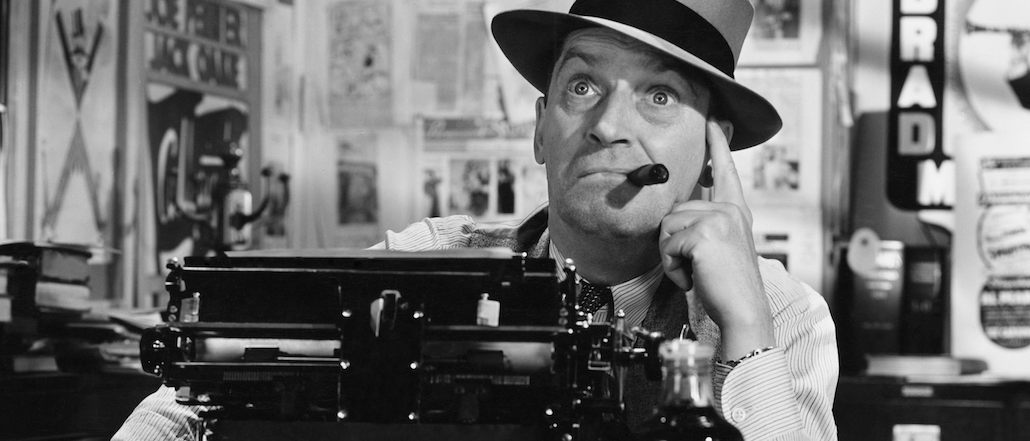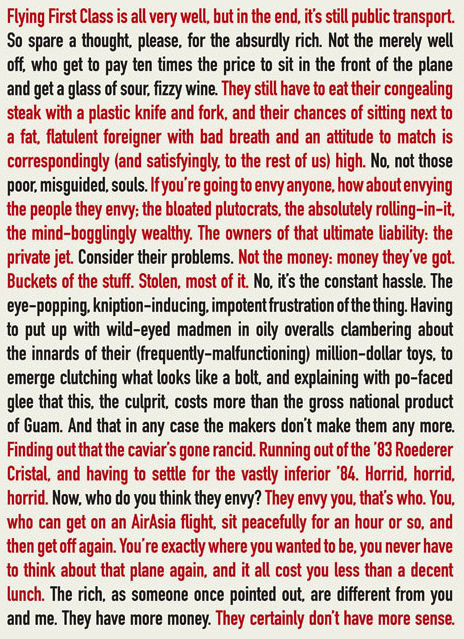Last chance to save on Digiday Publishing Summit passes is February 9

Mark Duffy has written the Copyranter blog for 10 years and is a freelancing copywriter with 20-plus years of experience. His hockey wrist shot is better than yours. Follow him on Twitter.
If you were Hunter S. Thompson, then, yes, I would give you a shot at writing a “native” ad for my brand. I’d give you several shots. But if you were Thompson, you wouldn’t lower yourself to do it. (Plus, you’d be dead. His 2005 suicide was a helluva ambient “shockvertising” ad for the effectiveness of Smith & Wesson products, though.)
You, Columbia boy, you’re not the new Hunter S. Thompson. You’re not even the new Arianna Huffington. Most of you don’t leave your two-screen desks except to take a leak. Can’t miss a *BREAKING* tweet! Gotta be “first” with that all-important re-coverage! You’re a bunch of well-educated wussies.
Why am I, an ad hack who graduated from a state college, daring to besmirch the prestigious, Ivy League world of digital “journalism”? Because even though I really majored in “hockey,” that “j” word is written on my diploma, too. Back in the early 1980s, I was a pre-Internet, portable typewriter-carrying newspaper journalist for six years before I sold out and went to ad school. My pay was five bucks an hour, plus mileage (25¢ a mile). But at least I got off my ass every day to cover a story — even when the story was a county freeholders meeting or yet another tractor pull.
But now, well-educated, delusional, underpaid journalists think that they can do advertising better than ad copywriters. It’s understandable that they think this: They think they can do pretty much everything better than everybody else. I’ve been around enough of them, in close proximity, to form my not-so-well-educated opinion.
There are two reasons why more and more major sites like Huffington Post, Mashable (yuck) and Gawker are paying journalists to write native ads and sponsored posts: They think it makes their money-making content less skeevy, and they think that ad copywriters can’t write long-form as well as journalists.
Both of these reasons are poppycock.
Because journalistic ad posts further blur the line between editorial and advertorial, they’re blatantly more skeevy. And while journalists, generally, may be better at journalistic prose than ad copywriters, CWs (the good ones) know damn well how to write long copy. But theirs, through training, is a different style. It’s entertaining, but it also sells. And if your native ad doesn’t sell (or increase brand awareness) what is it good for? Absolutely nuthin’ (say it again).
So go ahead publishers: keep trumpeting how much your journalistic branded content “respects the audience” more, and rattle off those meaningless click metrics, and quote dubious studies about how people feel “more comfortable” reading journalistic native ads till the cows come home. If it doesn’t work, it doesn’t work. And those chickens will eventually come home to roost (no more bad barnyard cliches, I promise).
Oh, a side note: If you’re letting MarCom or MarTech people write emotionally dead, buzzword-filled branded content, well, that’s even worse. Much, much worse.
Good long ad copy is written like one person talking to another, grammar be damned. Journalists are trained to not write this way. Below is an example of a good long copy ad for Air Asia, written by controversial British adman Neil French. Is it or isn’t a scam ad (something French is semi-famous for)? Honesty, who cares. A substantial amount of the work submitted to Cannes in the last five years has been fake.

Is it entertaining? Yes it is. Does it sell Air Asia to the target demo? It sure the hell does.
This is one example of what a good ad copywriter could do for your brand’s native content. French is far from the best long copy CW in history, but you get the point: Journalists don’t write branded content this way. And that’s to the detriment of your brand, believe me.
Homepage image courtesy of Shutterstock.com
More in Marketing

In Q1, marketers pivot to spending backed by AI and measurement
Q1 budget shifts reflect marketers’ growing focus on data, AI, measurement and where branding actually pays off.

GLP-1 draws pharma advertisers to double down on the Super Bowl
Could this be the last year Novo Nordisk, Boehringer Ingelheim, Hims & Hers, Novartis, Ro, and Lilly all run spots during the Big Game?

How food and beverage giants like Ritz and Diageo are showing up for the Super Bowl this year
Food and beverage executives say a Super Bowl campaign sets the tone for the year.





